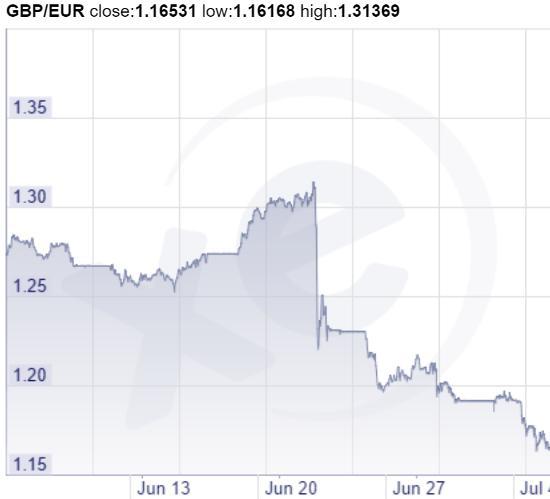Europe In Chaos - Can You Imagine The Fed Raising Interest Rates In This World?
Interest-Rates / Credit Crisis 2016 Jul 07, 2016 - 12:45 PM GMTBy: John_Rubino
 Two short months ago it was generally expected that US interest rates would rise for the balance of the year — a move made possible by steady economic growth and general global stability. Here’s a representative piece of reporting from early April:
Two short months ago it was generally expected that US interest rates would rise for the balance of the year — a move made possible by steady economic growth and general global stability. Here’s a representative piece of reporting from early April:
WSJ Survey: Most Economists Expect Next Fed Rate Increase in June
Most private forecasters surveyed expect the Federal Reserve will leave short-term interest rates unchanged at its April policy meeting, and next raise them in June.Nearly 75% of business and academic economists polled by The Wall Street Journal in recent days said the Fed would next raise its benchmark federal-funds rate at its June 14-15 policy meeting, down slightly from 76% in the Journal’s March survey.
The Fed in December raised its benchmark federal-funds rate to a range of 0.25% to 0.50% after holding it near zero for seven years, and pledged to raise it gradually in coming years. It held rates steady at its policy gatherings in January and March, citing weak inflation and global economic and financial uncertainty.
Fed officials at their March meeting expected to raise the fed-funds rate by a half a percentage point this year. That implies a slower pace than they predicted in December, when they penciled in a total increase of a full percentage point by year’s end.
Ah, the good old days, when crises were few and mostly far away, governments could be trusted to cope, and the Fed could use terms like “normalize” with a straight face. Now, alas, it’s all about damage control — and rats jumping ship. Some components of the gathering storm:
Brexit fallout. Several interesting post-vote developments include a plunging pound sterling, decapitation of the major UK political parties, and — much more serious from a financial stability point of view — a wave of withdrawals from UK property funds that have forced a total of 6 to halt redemptions. That’s reminiscent of those Bear Stearns hedge funds that did something similar just before the Great Recession hit.

Italian bank collapse. These banks have had 15%+ non-performing loan ratios for the past year, which is to say they’re already dead but, inexplicably, are still walking around. Now they’re tanking and the Italian government will soon be forced to bail them out. And — here’s the really scary part — in his desperation, Italy’s prime minister today asserted that Deutsche Bank is actually more dangerous that its Italian counterparts. Governments competing over whose banks are in worse shape are playing with fire.
Interest rates plunge. Already-ridiculously-low interest rates have, Post-Brexit, fallen further. US 10-year Treasuries now yield just 1.4%, which means negative rates may be coming to America. Kind of strange, really, that everyone else is already there and the US for some reason isn’t. In any event, interest rates were already fatally-low for many financial business models including money market funds, pension funds and insurance companies, so the ongoing drop is another nail in those coffins. Expect some big, hairy failures in the year ahead.
Add it all up and a picture emerges of a global crisis with Europe at its epicenter. Brexit, contrary to conventional wisdom, is a side-effect of this mess rather than a cause. Italy’s banks were always going to need a bail-out and Deutsche Bank was always going to blow up. Viewed through this longer-term lens, Britain’s decision to get out while the getting is relatively good may turn out to be prescient because it allows for a dramatic currency devaluation which should cushion the domestic economy from external shocks. As with choosing not to adopt the euro back in 2002, being near Europe but not of it will be far better than the alternative in years to come.
As for the Fed, the idea that the US can raise interest rates while the above is going on is ludicrous. Much more likely is a zero to slightly negative Fed Funds rate by this time next year, with a near-flat yield curve as long rates fall faster than short. And since raising rates was the only remaining way to save the US financial sector from the ravages of low returns, look for the crisis to migrate across the pond shortly.
By John Rubino
Copyright 2016 © John Rubino - All Rights Reserved
Disclaimer: The above is a matter of opinion provided for general information purposes only and is not intended as investment advice. Information and analysis above are derived from sources and utilising methods believed to be reliable, but we cannot accept responsibility for any losses you may incur as a result of this analysis. Individuals should consult with their personal financial advisors.
© 2005-2022 http://www.MarketOracle.co.uk - The Market Oracle is a FREE Daily Financial Markets Analysis & Forecasting online publication.



